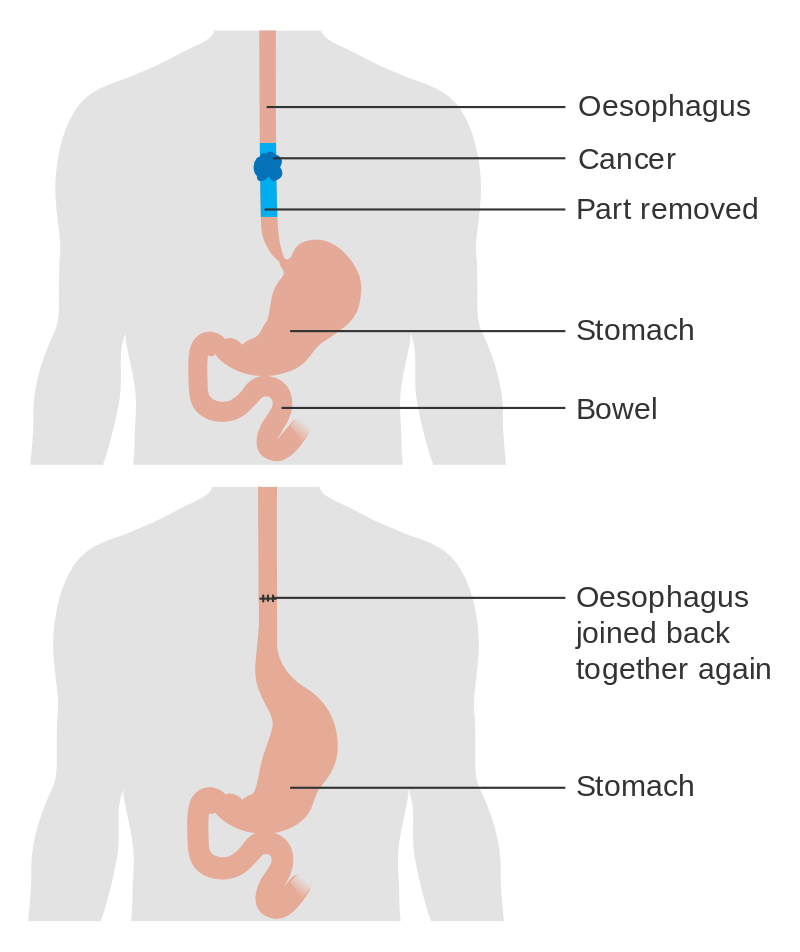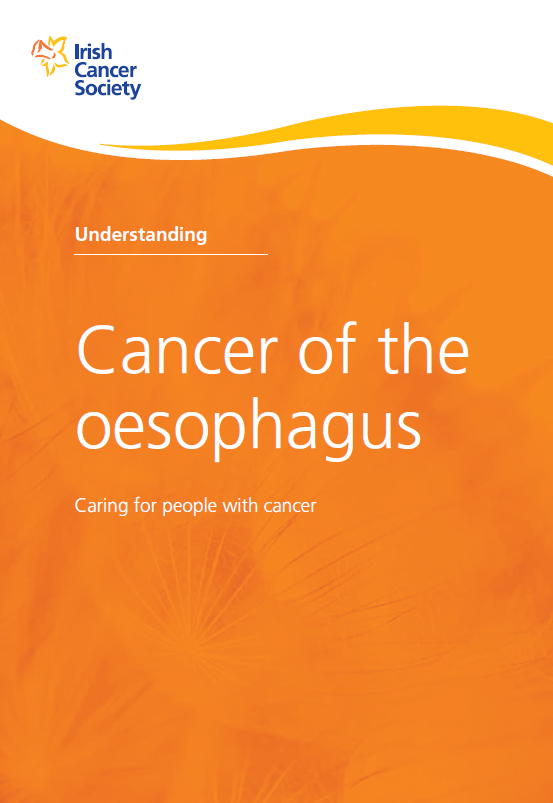Surgery for oesophageal cancer
Information about the types of surgery used to treat oesophageal cancer, including oesophagectomy, oesophago-gastrectomy, total oesophagectomy and lymphadenectomy.
Surgery is the most common treatment for cancer that hasn’t spread outside the oesophagus. You’ll have tests before surgery to make sure you are well enough.
Read more about getting ready for surgery.
Types of surgery
Your surgeon may remove the whole oesophagus or just the part that has cancer. It depends where the cancer is.
Because the oesophagus is a long tube going from one body part to another, the surgery can be done in different ways. Your surgeon may need to make a cut (incision) or cuts in your chest, tummy (abdomen) or neck to remove the tumour, depending on where it is.
Common types of surgery:
The part of your oesophagus with cancer is removed, along with lymph nodes and nearby soft tissues. The surgeon pulls up your stomach and joins it to the remaining part of your oesophagus.
Rarely it’s not possible to join your stomach to the remaining part of the oesophagus. In this case, a section of your bowel (colon) will be used to replace part of the oesophagus.

If the cancer has spread to your stomach, the upper part of your stomach can be removed, as well as the affected part of your oesophagus. This is called an oesophago-gastrectomy. A piece of bowel may be used to join the remaining part of your oesophagus to your small bowel.
If more of the stomach is involved than the oesophagus, sometimes the whole stomach is removed and the remaining oesophagus is joined to the small bowel (called an extended total gastrectomy).
This is an operation to remove the uppermost part of the oesophagus and the voicebox (larynx) to treat very high upper cancers of the oesophagus or pharyrnx.
During the surgery your surgeon will take out some of the lymph nodes from around your oesophagus. This is called lymphadenectomy. If the lymph nodes contain cancer, removing them can help to stop it spreading and may help guide further treatment. The lymph nodes removed will be looked at under a microscope to give your doctor more information about the stage of your cancer.
After oesophageal surgery
- You’ll likely spend a few days in intensive care or a high-dependency unit. During this time, your team will closely monitor your recovery.
- You may not be able to eat or drink straight away. You’ll usually have a feeding tube placed in your small intestine during surgery to help meet your nutrition needs while the operation site heals.
- Most people are ready to go home 10 to 14 days after surgery.
Read more about recovering after surgery.
Starting to eat and drink again
You’ll start with:
- No food or drink by mouth for a few days
- Feeding through a tube to give your body nutrition
- Fluids by mouth, once your surgeon is happy with your healing
- Soft foods, slowly introduced and gradually increased
Tips to help:
- Eat slowly
- Chew well
- Follow advice from your dietitian
- Keep a food diary if needed
Your dietitian will support you with eating plans and ensure you’re getting enough nutrients. You may continue tube feeding at night after you go home. You and a family member or friend will be shown how to manage this safely.
Common eating-related issues after surgery
It may take a while before you get back to normal eating and drinking. It depends on the type of surgery you have and the time it takes for your wounds to heal.
You might experience:
- Feeling full and uncomfortable after eating only small amounts
- Having little or no appetite
- Weight loss
- Nausea and vomiting
- A change in your bowel habit e.g. diarrhoea or constipation
Weight loss is normal after this surgery. It often improves over time, though you may not return to your previous weight. Your care team will support you with eating, symptoms, and weight management.
Read more about eating difficulties and weight loss.
More information
There's more information on recovering from surgery in our oesophageal cancer booklet. Download the booklet below, order a copy from our Support Line on 1800 200 700 or pick one up in a Daffodil Centre.
Talk to a Cancer Nurse

Support Line
Our Daffodil Centres


